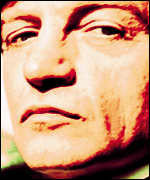Pander! Panda! Panzer!
| |

| Mark E. Smith of The Fall has been leaning towards solo performances for a while. Besides regularly sacking his band, 1999's The Marshall Suite contained the brilliant 'Birthday Song' a monologue against a Van Gellis-like keyscape by Julia Nagle. 2000's The Unutterable contained 'Kettamine Suns', a song preceded by a poem about 'the lesser qualities of family life'. Smith, it seems, has always been writing plays, ballet librettos and attending songwriting conferences with Michael Bracewell. His first spoken-word album, 1998's prosy The Post Nearly Man, was extraordinarily inaccessible and unrealised, containing an apparent sci-fi script and one excellent H. P. Lovecraft adaptation in 'The Horror in Clay'. As literature, only 'Dissolute Singer' which detailed an American tour really stood up. Enlivened by musical samples from The Fall's back catalogue a solo career did not beckon. Pander! Panda! Panzer! may not be particularly popular either (It is one radio-friendly 42 minute track), yet on the new material he escapes the shackles of his band and strikes out on his own. He seems to have learnt the lessons of Post Nearly Man, which he describes as 'semi-rubbish, semi-ok with 15% on top brilliant', and the mood is more varied. Smith the hectorer is interspersed with Smith the affable. Several pieces here were recorded in front of an American audience (where he's happy, away from the beady eye of the English press) whom he treats like an old hand: It's Saturday. Let's go out and float our money around in front of low-paid student bar-staff. There's also a foot and mouth joke. The album begins with Smith and a European-sounding woman reading a history book, occasionally in synch. In this it resembles The Unutterable's Grant Showbiz-produced 'Devolute' whose authority and vocal quality this recording shares. Smith's voice is stronger and projects more than on the largely dictaphone-recorded Post Nearly Man. While that listening experience was paced with whistling and a minute's worth of silence, each monologue on Pander! Panda! Panzer! is surrounded by music that sounds like something out of Baraka. The alternately portentous and pathetic result is similar to word-terrorist Chris Morris' radio show 'Jam', which itself featured The Fall. For example, there is nothing in the following lyrics to signify that when delivered you would feel like you had witnessed someone giving up for good: What does it all mean in the end, it is ... What does it matter? Dr Book's letter. Smith is interested in words - he even gets a kick out of his name (which appears twice here) - and 'Pan' appears in each of the three words of the title. He describes their different sounds as 'the outside flavourness of it'. Pan has long been a Smith referent. |

| Sadly, he also reads lyrics from Fall songs and pieces from The Post Nearly Man. With the plethora of live albums and alternate versions doing the rounds, you may wonder whether we need a spoken word version of 'Idiot Joy Showland'. To an American audience the lyric may be unfamiliar, yet in the context of an album it's bathetic. The genius of Smith's lyrics are as lyrics. There are too many rhymes for many of them to work as spoken verse and without the striking and offhand marriage of lyric and music the context of a lyric book would be more fitting. And it is sad to see such throwaway brilliant lines as 'You cannot legislate against wrongful encouragement' (from the introduction to 1988's 'Legends of Xanadu') placed in a prominent position for all to see as if Smith were saying 'I don't think I've got enough attention for this nugget'. 'Lucifer over Lancashire', as spoken, works because the lyrics are so spiky they repay repeated listening. And 'Dissolute Singer' sounds brilliant. Yet why are they included here? They weigh down the album and root it in the past. The other half is stunning. Here, the new material flies: 'Please give me American money' reads a learn-English tape narrator. A piece which appears to be titled '5 Previously Unreleased Sentences' reads, I was 10 years old when I was born Simple, but aurally effective. Smith mixes languages, stresses the distinctions between words, flicks through radio stations and mentions German tanks, Mauser guns and Churchillian campaigns. As a device another filmscript is read (or at least begun), and there are numerous illogical lists. Surveillance - Smith's pet hate - gets another airing as he condemns 'insecurity camera(s)' and 'a wholesale license for nosey-parkering'. The reason to listen is for when he hits his stride as in this passage, loaded with specifics: Digging deep in the ashtrays I discovered a coat. It was warm and filled with the finest feathers. Autumn said 'Hello'. 'Welcome!' said I, 'I must check the oil for paraffin'. As in the mastery of yore he pre-empts your reaction; Follow the route as it was planned. The topic had no meaning like the menu on the hard shoulder. Rewind, rewind, this is good. Smith is not as consistent as he used to be, and the band isn't there to back him up. Yet he has mastered solo recording. Still making unique sounds with that unique voice, following his own agenda, this is his best release since The Unutterable, whose confident production it shares. He shakes off The Fall on the tracks which don't lean on them and has found his stride. © 2002 Matt Bryden |